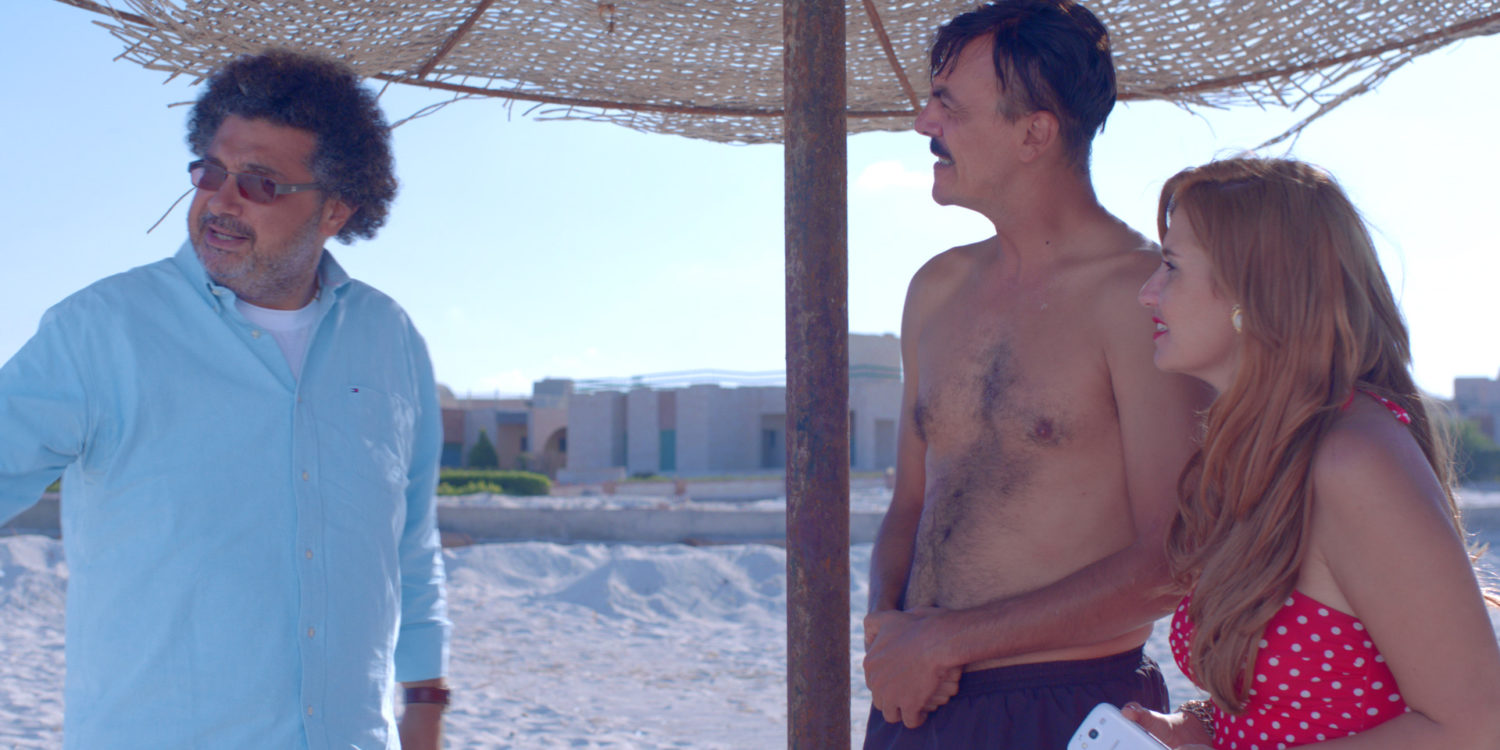Opening night film for Safar Film Festival 2016 as a tribute to late Egyptian director Mohamed Khan, 14 September at 8:30 pm at Institute of Contemporary Arts (ICA), London. You can see more information and buy tickets HERE
Before the Summer Crowds, Egypt, 2015, directed by Mohamed Khan
Reviewed by Professor Robert Abrams, Professor of Old Age Psychiatry, Weill Cornell Medical College, New York. Originally published on Medical Humanities BMJ Blogs.
The first thing one can say about Mohamed Khan’s acidly satiric film Before the Summer Crowds is that, notwithstanding its title, it is uncommon summer fare. It is neither light nor breezy, and there’s not much of a plot. The principal characters comprise a trio of clueless, seemingly harmless upper-class individuals who have moved into their “chateaux” in the Egyptian beach vacation community of ‘Blue Beach’ before the regular season has begun. But the viewer is not allowed to retain this initial impression of their harmless existence for long; we are soon let in on the shockingly extensive roster of evils that lies beneath their casual banality: Infidelity, gluttony, corruption, spiritual emptiness, indifference to life, and even a taste for carnage.
First, there’s the pudgy Dr. Yehia (Maged El Kedwany), a man preoccupied with food and sex, whose private hospital scandalously reaps profits by understaffing its medical ranks and hiring inexperienced physicians. Even when he performs a supposedly life-saving cardiopulmonary resuscitation on a beautiful young woman, it is clear that his own sexual gratification is being addressed simultaneously. Yehia’s wife Magda (Lana Mushtaq) is the very personification of emptiness, attempting to sate that void by gorging herself on peanut butter. Magda owns an inherited chateau—a facetiously pretentious name for a beach cottage–in the ‘first row’ of the seaside community, a distinction of which she is inordinately proud and one that she believes places her apart from the ordinary parvenus who arrived at ‘Blue Beach’ more recently. Magda tolerates Yehia, but there is no sense of love between them, not even lust. We see Magda meditating, but there’s nothing spiritually meaningful about what she does—her mind is already empty.
In the course of the film, Yehia becomes involved in a mutual attraction with Hala (Hana Shiha), a young mother who is uninterested in her children and uses her chateau as a trysting place for a rendezvous with Hesham (Hani El Metennawy), her narcissistic B-movie actor-lover. (This fact gives a rather smarmy double meaning to the name ‘Blue Beach’). When Hala learns that Hesham has been unfaithful—no great surprise—she finds common ground, albeit on very shallow soil, with Yehia. They flirt with the idea of having an affair unbound by any conscience or moral codes.
Yehia is at once grotesque and immature, but one is gradually made to understand that his immaturity is far from victimless. His patients are cheated, a court case of medical negligence case is underway; his wife is cheated on; and he sleeps drunkenly as Magda’s pet parrot—the only creature she seems to love—is set upon by cats. It is not the feline hunting instinct that is highlighted in that scene of carnage but Yehia’s indifference. Even Yehia’s preparations for a festive dinner with freshly caught fish seem more like a bloody massacre and an extravagant waste of marine life than a demonstration of his culinary skills.
The working-class young man, Gom’aa (Ahmed Dawood), the resort bell-boy, is seen by Yehia, Magda and Hala as a dispensable entity to be treated with barely hidden condescension. Gom’aa is mainly useful for errands, watering the garden when Yehia doesn’t feel like doing it himself, and fetching things for Hala.
Not a great deal happens in Before the Summer Crowds; but it somehow leaves the viewer with a surprisingly strong impression of sadness and regret. All of the characters are presented as prisoners in different ways of this gated community, unable to move beyond its strictures. The only exception is Gom’aa, a young man who comes from another world looking for his ‘Shangri-La’ in ‘Blue Beach’. Yehia, Magda and Hala have material abundance, sex and food, but are utterly bereft of passion or purpose. The lives of these principals—again save for Gom’aa—are so pathetically empty and loveless that the compassion of the viewer for these otherwise contemptible individuals is paradoxically elicited. How? The key is in the extraordinary acting, where we are unwittingly induced to experience emotions that should belong to the characters but do not; in a way, it might be said that this is the hallmark of all excellent acting. Here, in the subtly played role of Dr. Yehia, Maged El Kedwany, demonstrates why he is considered one of the finest contemporary character actors in the Arab world. Although I have been told that Before the Summer Crowds is not typical of the films of the late Mohamed Khan, this deceptively non-action film skillfully not only skewers the bourgeois vacationers of Blue Beach for their corruption and emptiness, but it also lets us feel the sadness of their lives.
Address for correspondence: rabrams@med.cornell.edu
About Dr Robert Abrams:
Dr. Robert C. Abrams is Professor of Psychiatry and Professor of Psychiatry in Geriatrics and Palliative Medicine at Weill Cornell Medical College in New York City. Dr. Abrams has coupled his professional focus on affective disorders in the elderly with a lifelong interest in history and the humanities, having published studies on the final depression of Queen Victoria and her relationship with her physician, Sir James Reid, as well as an analysis of Kazuo Ishiguro’s “Never Let Me Go.” He was first introduced to contemporary Arab cinema by Dr. Khalid Ali, the Screening Room Editor of the journal Medical Humanities, and has since written reviews for films featuring behavioral and aging issues.



